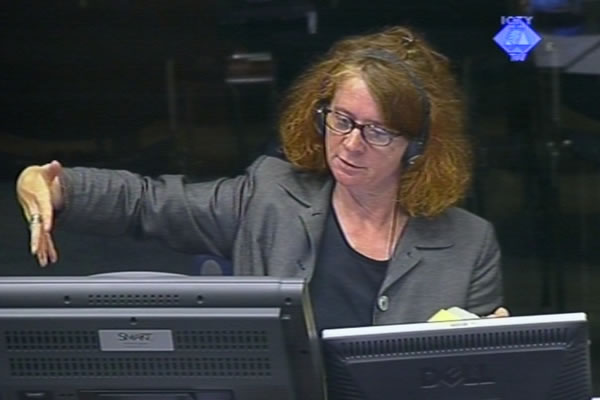Home
DEPORTATION IS ‘FORCIBLE EVACUATION’
Prosecution witness Christine Schmitz didn’t deny that in July 1995 Muslim civilians wanted to leave Potocari, but she insisted they had already been expelled from their homes in Srebrenica. According to her, this was a deportation and not evacuation. The German nurse described two meetings with Ratko Mladic in Potocari in July 1995
 Christine Schmitz, witness at the Ratko Mladic trial
Christine Schmitz, witness at the Ratko Mladic trial German nurse Christine Schmitz arrived in Srebrenica on 24 June 1995, about ten days before Mladic’s troops attacked the enclave which was nominally protected by the UN. Schmitz was there as a project coordinator with a non-governmental organization, the Doctors without Borders, to help the sick and exhausted locals. In her evidence, Schmitz spoke about the events before and after the Serb troops overran Srebrenica in July 1995.
During Schmitz’s testimony today, the accused diligently took notes, exchanged about 10 written messages with his defense lawyers and consulted with them. When Mladic started talking to his defense lawyers too loudly, the judge ordered the witness to stop talking to allow Mladic to consult with his defense properly. Mladic saluted Judge Orie as a sign of gratitude.
Nurse Schmitz testified in March 2012 at the trial of Radovan Karadzic and today the consolidated statement she gave the OTP investigators was admitted into evidence. In the summary of the statement, the witness described the heavy shelling of Srebrenica’s surroundings that woke her up on 6 July 1995. At the time, she lived in the town center. As days went by, the shells hit closer and closer to the town center. On 11 July 1995, the witness decided to evacuate together with her patients to the UN base in Potocari. Schmitz estimated that by that evening, about 20,000 persons were gathered there. As she recounted, the people trembled in fear and were either in a state of shock or completely apathetic.
The next day, on 12 July 1995, Schmitz met the accused twice. The first encounter happened around noon, when Schmitz approached Mladic to protest against the VRS plan to evacuate the wounded. Schmitz insisted her organization was to be in charge of their evacuation. The interpreter told her, ‘get out of here and mind your own business’.Schmitz didn’t know if those were Mladic’s words, because he spoke to her in Serbian. That same evening, Schmitz met Mladic again and asked him for permission to separate the sick and wounded civilians from the group of refugees in Potocari in order to give them medical treatment. Mladic granted her permission to do that. Various international humanitarian organizations later evacuated all the 55 wounded from the Srebrenica hospital and the local staff working for the Doctors without Borders. Only one person wasn’t evacuated: logistics clerk Meho Bosnjakovic who decided to stay with his family. Bosnjakovic’s remains were found in one of the mass graves in which the victims of genocide in Srebrenica were buried.
The prosecutor showed several reports the witness sent to the Doctors without Borders’ team in Belgrade. In her reports, Schmitz described in detail the shelling, the evacuation of patients from the hospital and the deportation of civilians from Srebrenica. In the cross-examination, Mladic’s defense counsel Nenad Petrusic objected to her use of the word ‘deportation’. It is a legal term, Petrusic argued, and Schmitz does not have a law degree. Schmitz explained that to her as a layperson a deportation meant ‘forcible evacuation’ and this is what happened in Srebrenica. Schmitz didn’t deny that civilians ‘wanted to leave Potocari’ but in her opinion they had been forced to leave their homes in Srebrenica before getting to Potocari. ‘They wanted to leave Potocari, but they didn’t want to leave Srebrenica’, Schmitz concluded. Schmitz described what the ‘forcible evacuation’ looked like, saying that the Serb soldiers formed a ‘chain’ or a gauntlet to direct civilians towards buses.
Christine Schmitz left Srebrenica on 21 July 1995. After 15 years with the Doctors without Borders, Schmitz now works as a nurse in Berlin. After Schmitz completed her evidence, Ratko Mladic’s trial will continue tomorrow with the testimony of a former UN observer who served in Srebrenica, Joseph Kingori.
